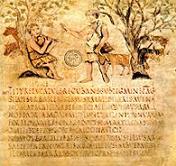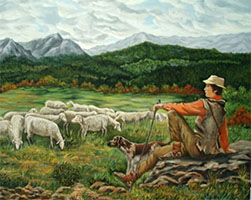 A Greek word that can be translated as “extract” came to Latin as eclŏga , which in Spanish became eclogue . This concept is used in the field of literature to name a bucolic poem that presents an idealization of rustic life .
A Greek word that can be translated as “extract” came to Latin as eclŏga , which in Spanish became eclogue . This concept is used in the field of literature to name a bucolic poem that presents an idealization of rustic life .
It should be noted that, according to literary theory, the bucolic genre is one that focuses on the rural , generally having shepherds as protagonists. This genre is characterized by usually developing through dialogues .
An eclogue, therefore, is a piece that is made up of dialogue between shepherds in a country setting. In this environment, which is presented as paradisiacal, shepherds often talk about love . In certain cases, the dialogue is replaced by a pastor's monologue.
The Greek Theocritus (310 BC – 260 BC) is noted as the creator of the eclogue and bucolic poetry . In this sense, his idylls are mentioned as the first eclogues. Mosco of Syracuse and Bion of Smyrna are other Greek poets who contributed to the development of the eclogue. Later, Francesco Petrarca , Pierre de Ronsard , Garcilaso de la Vega and other authors also ventured into this type of poetry.
Over time , eclogues began to emerge whose fictional characters covered up real personalities. Another step in the evolution of this type of work was the direct use of real-life characters. In many cases, the eclogues became plays and were performed on different stages.
One of the peculiarities of the eclogue is that its monologues and dialogues occur within a single period of time, unlike other genres, such as theater. If we wanted to compare them, we would have to extract a single scene from a drama, to achieve parity at a temporal level.
 Generally, the beginning of the eclogues is intended for the introduction of the story , to give rise to the plot and, at the end, present the outcome. As is common in any literary genre, we have at our disposal a large number of works from all times to appreciate with examples the characteristics of the eclogue. In this case we will talk about some of the most notable ones.
Generally, the beginning of the eclogues is intended for the introduction of the story , to give rise to the plot and, at the end, present the outcome. As is common in any literary genre, we have at our disposal a large number of works from all times to appreciate with examples the characteristics of the eclogue. In this case we will talk about some of the most notable ones.
One of the eclogues that has achieved the greatest relevance was written by Garcilaso de la Vega and is titled The Sweet Lament of Two Shepherds . In it we have two shepherds who talk about their respective love stories: Nemoroso laments the death of Elisa, while Salicio expresses his suffering for the rudeness he must endure from his beloved.
Another of Garcilaso de la Vega's remembered eclogues is In the Middle of Winter , in which various characters from his first work are presented and the theme is once again suffering in the face of unrequited love. In That Honest and Pure Will , on the other hand, the author has a group of shepherds talk about women, but not complaining about deceit and spite, but rather talking about the admiration she provokes in them.
Juan del Encina is another author who has left us memorable eclogues. Such is the case of Eclogue of Cristino and Febea , which focuses on the story of a hermit who takes refuge in religion and seeks the advice of a close friend to overcome the crossroads of having fallen in love with a woman . In another of his works, Eclogue of Plácida y Vitoriano , there is the particularity that it is the woman who recites most of the lines. Finally, in Eclogue of the Great Rains Encina shows a dialogue about Christmas night and the consequences of the rains.
